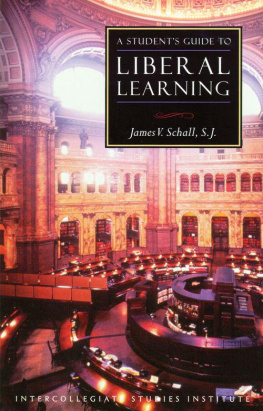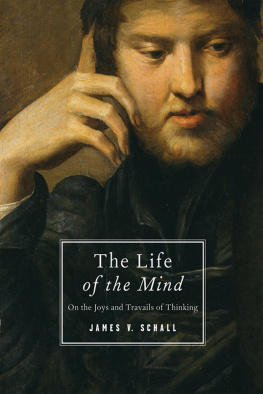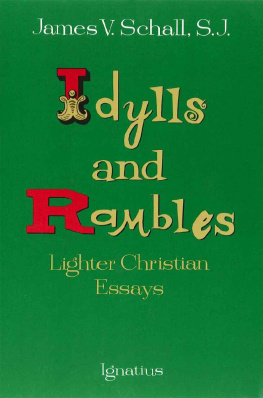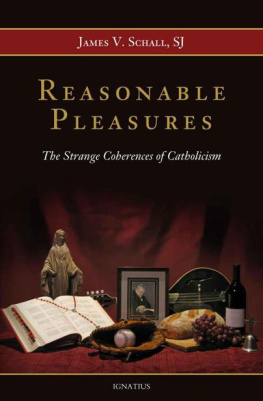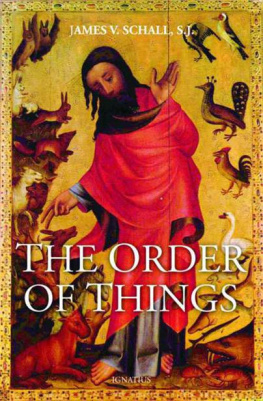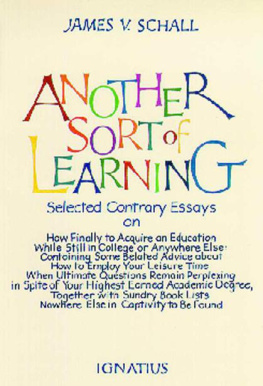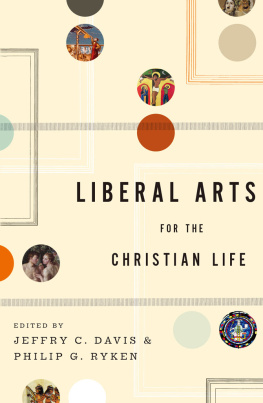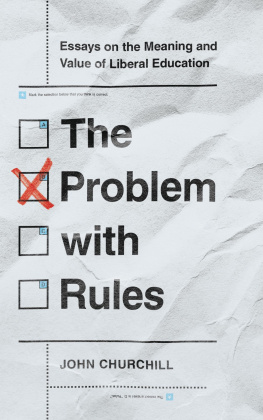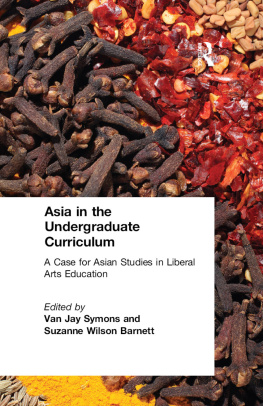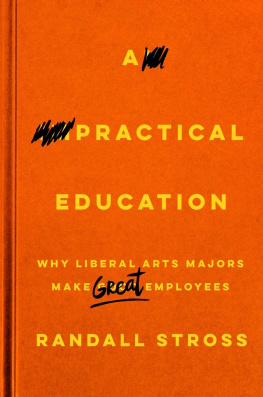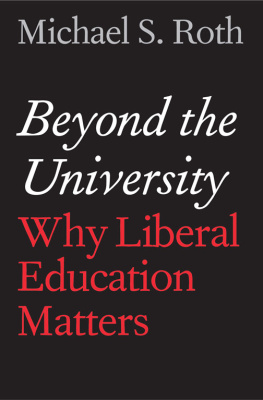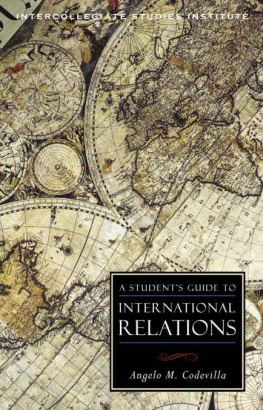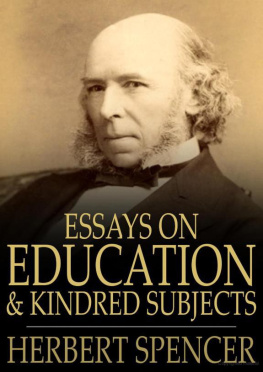THE PRESTON A. WELLS JR. GUIDES TO THE MAJOR DISCIPLINES
GENERAL EDITOR
J EFFREY O . N ELSON
EDITOR
JEREMY B EER
P HILOSOPHY Ralph M. McInerny
L ITERATURE R. V. Young
L IBERAL L EARNING James V. Schall, S.J.
T HE S TUDY OF H ISTORY John Lukacs
T HE C ORE C URRICULUM Mark C. Henrie
U . S . H ISTORY Wilfred M. McClay
E CONOMICS Paul Heyne
P OLITICAL P HILOSOPHY Harvey C. Mansfield
P SYCHOLOGY Daniel N. Robinson
C LASSICS Bruce S. Thornton
A MERICAN P OLITICAL T HOUGHT George W. Carey
R ELIGIOUS S TUDIES D. G. Hart
A Students Guide to Liberal Learning

JAMES V. SCHALL, S.J.
ISI B OOKS
W ILMINGTON, D ELAWARE
For further essays, educational resources, and guidance from James V. Schall, visit his website at www.morec.com/schall .
The Student Self-Reliance Project and the ISI Guides to the Major Disciplines are made possible by grants from the Philip M. McKenna Foundation, the Wilbur Foundation, F. M. Kirby Foundation, Castle Rock Foundation, the people of MBNA America, and other contributors who wish to remain anonymous. The Intercollegiate Studies Institute gratefully acknowledges their support.
Copyright 2000 Intercollegiate Studies Institute
Fifth printing, November 2007
All rights reserved. No part of this publication may be reproduced or transmitted in any form or by any means, electronic or mechanical, including photocopy, or any information storage and retrieval system now known or to be invented, without permission in writing from the publisher, except by a reviewer who wishes to quote brief passages in connection with a review written for inclusion in a magazine, newspaper, or broadcast.
Cataloging-in-Publication Data
Schall, James V.
A students guide to liberal learning / by James V. Schall.
2nd ed.Wilmington, Del. : ISI Books, 2000.
p. cm.
ISBN 1-882926-53-6
ISBN 978-1-61017-044-4 (electronic)
1. Education, Humanistic. 2. Education philosophy.
I. Title. II. Title: Guide to liberal learning.
LC 1011 .S33 2000 00-101234
370.11/2dc21 CIP
Published in the United States by:
ISI Books
Post Office Box 4431
Wilmington, DE 19807-0431
Cover and interior design by Sam Torode
Manufactured in the United States of America
CONTENTS
APPENDIX:
Schalls Unlikely List of Books to Keep Sane By
INTRODUCTORY NOTE

T HE IMPORTANT THINGS , Aristotle told us, are to be known for their own sakes, not for some useful or pleasurable purpose, however useful or pleasurable they might also be. Scholars tell us that the ages have saved for us Platos literary works and Aristotles more pedestrian class-notes or lectures. The first sing; the second demand our careful, repeated attention. The fact that we have both sorts of heritage contains a lesson for us. We oftentimes need to be called out of ourselves by something that is simply charming or delightful. At other times, we recognize that if we are to grasp the essence of something, it will take our undivided attention over a long period of time, perhaps a lifetime.
Where might we go, what might we do to find the truth, to find what makes sense, what incites us to use that mind we all have been given to pursue by it our human task, to know what is , to know what we ought to do? No age has an easy time of it, trying to figure things out. Our age has difficulty asking these questions, not merely because we have so much knowledge available to us or because, compared with other ages, there are so many of us, but also because we are an age of doubt, an age that does not seem to want to know what it can know.
The human mind must also choose to use itself properly to achieve its primary purpose which is to find the truth of things. When a human being is functioning normally, when he is being what he is given by nature to be, he is using his mind. And yet, the mind can talk itself out of using itself. Many great thinkers suspect this choice is what has happened to us. We have talked ourselves out of knowing what we can know, and in particular, what we are.
Is there anything we might do about this? What we need to do is to find some guide, some book, some friend, some professor perhaps, some lecture, some journal or essay, that will alert us to the fact that what we are mostly given is skewed. This discovery will not be easy. We do not like to rethink things. We do not like to challenge commitments to schools or faculty or ideas that bear the mark of popularity or accepted habit.
Many doubt and are taught to doubt whether things can, in principle, be true. Indeed, few are allowed to think, as a first premise, anything else but doubt and are surprised, on examination, at the little evidence there is for such a position. Where does this situation leave the bewildered student, the potential philosopher, as Plato called him? It leaves him largely on his own, or at least at first sight. This essay is addressed primarily to those present and former students at college, university, and graduate levels, and their parents, who are aware that what is being presented to them in the classroom has something seriously skewed about it. But this essay is not an anti-intellectual tractatejust the opposite. It is designed to alert the inquiring student to the fact that, as the famous philosopher Etienne Gilson once wrote in his remarkable The Unity of Philosophical Experience , there are things and I can know them. This essay is a guide to true liberal education, one that is capable of alerting us to intellectual riches that are almost never found in universities or in the popular culture.
So what one reads here is after the manner of a minority opinion. I will be enthusiastic about books, authors, and ideas about which most students will never have heard or, having heard of them, will have heard nothing good about them. Thinking is itself, however, an adventure. If someone wants to begin, he could do worse than to begin with the books and ideas that I have indicated here. Needless to say, this guide to liberal learning, as it is called, is not extensive. Yet, each book read leads to something else. I dare say, that by the time a student has pursued ideas in the first book he finds mentioned here, he will be in that profound period of life Cicero called old age, the title of one of his essays that I want everyone who begins these reflections eventually to read, preferably before old age itself.
I WOULD NOT represent [Robert E.] Lee as a prophet, but as a man who stood close enough to the eternal verities to utter prophecy sometimes when he spoke. He was brought up in the old school, which places responsibility upon the individual, and not upon some abstract social agency. Sentimental humanitarianism manifestly does not speak to language of duty, but of indulgence. The notion that obligations are tyrannies, and that wants, not deserts, should be the measure of what one gets has by now shown its destructive power. We have tended to ignore the inexorable truth that rights must be earned. Fully interpreted, Lees duty is the measure whereby freedom preserves itself by acknowledging responsibility. Man, then, perfects himself by discipline, and at the heart of discipline lies self-denial. When the young mother brought an infant for Lee to bless, and was told, Teach him to deny himself, she was receiving perhaps the deepest insight of his life.
R ICHARD W EAVER, Lee as a Philosopher,
The Southern Essays of Richard Weaver

FROM WHENCE DID THESE OBSERVATIONS COME?
Next page
